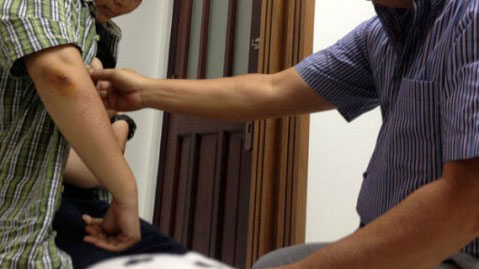Vietnam mulls recognizing sex reassignment
The Vietnamese Ministry of Health has proposed either not acknowledging gender reassignment, as it has always been the case before, or permitting the practice on a selective basis.
Nguyen Huy Quang, head of the Legislation Department under the Ministry of Health recently said that the ministry is currently giving its opinions on the draft of the revised Civil Code.
The ministry has suggested two ways to deal with the gender reassignment issue.
One is not acknowledging gender reassignment as before, while the other alternative is allowing the procedure but on a selective basis.
 |
Pham Le Quynh Tram, a transgender teacher who lives in Ho Chi Minh City, told Tuoi Tre (Youth) newspaper her elation at the Ministry of Health’s growing interest in the transgender community by putting forward such proposals.
Tram, who was born as a male under the name Pham Van Hiep, revealed the mental agony she was through to become a real, fulfilled woman as she is now.
“All local hospitals turned me down. Having the gender reassignment surgery is costly and highly worrisome,” Tram said.
It took her one year and eight months of tiring medical check-ups and paperwork to earn her much-craved recognition as a female.
“After surgery, transgender people will live more responsibly once they are granted documents recognizing their new gender. The documents are one of the integral steps to transsexuals’ social reception,” the woman noted.
Tram estimated a sex readjustment operations performed in Vietnam would cut costs by five times compared to those conducted abroad.
 |
According to Dinh Hong Hanh, a specialist in legal matters at ICS, a local NGO dedicated to empowering the lesbian, gay, bisexual, and transsexual (LGBT) community in Vietnam, an estimated 2,000-3,000 female transsexuals currently reside in Ho Chi Minh City.
Almost 80% of the 219 subjects in a survey expressed their wishes for a gender reassignment surgery.
As Vietnam has yet to acknowledge transsexuals, such people remain ineligible for healthcare and psychological consultancy prior to and after surgery.
“Transsexuals thus take matters into their own hands by buying medicine and gender-changing hormones with unknown origin and quality, which may bring about damaging complications,” Hanh noted.
On a shoestring budget, these people generally have their operations performed at unauthorized facilities, she said, adding that some did die during such high-risk surgeries.
Hanh underscored that the local LGBT community has great trust in Vietnamese surgeons’ skills and expertise.
Meanwhile, Phan Thanh Nhan, manager of the “Open Shelter” project launched by Open Group, urged that real demand for gender reassignment surgery be fully assessed.
Open Group is a local NGO which is devoted to providing support for those prone to gender violence and discrimination, as well as other vulnerable groups.
Nhan also pointed out the immense difficulties that transgender people currently encounter, including losing jobs and having no legal documents following their unpermitted surgeries.
Dr. Nguyen Nha, a revered culture researcher and historian, is supportive of allowing gender reassignment.
Lawyer Huynh Phuoc Hiep, of the Ho Chi Minh City Bar Association, voiced his approval of acknowledging sex readjustment, but the acknowledgment should come with a clear process and specific regulations to deter those who consider the reassignment procedure a fad only.
Hiep also pointed out that the phrase “gender determination” be used instead of “gender switching,” as transsexuals go after their true gender, not changing to the opposite sex.
The lawyer also underlined the difficulty in determining in which case sex reassignment is allowed.
According to Tran Tien Dung, office chief and spokesperson of the Ministry of Justice, his agency is gathering public opinions on the draft of the revised Civil Code.
Vietnamese doctors can do transgender reassignment surgery
Dr. Nguyen Huy Tho, former head of the Reconstruction and Odonto-Stomatology Department of the 108 Military Central Hospital, and deputy chair of the Hanoi Plastic and Cosmetic Surgery Association, affirmed that local plastic surgeons are entirely capable of performing gender reassignment surgery after receiving some training.
He added that it would require a team of doctors and surgeons who are in charge of different phases including pre-surgery psychological counseling, hormone administration, surgery to remove the existing reproductive organ and construct a new one, and administering hormones to patients for the rest of their lives.
Dr. Tho said that local doctors now only reconstruct malformed or malfunctioned reproductive organs.
It is relatively easy to turn a male into a female, while it would be a major technical challenge the other way round, he stressed.
